The Gabba
| The Gabba | |||||||||||||||||
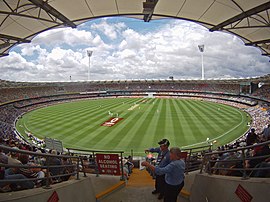 | |||||||||||||||||
| Ground information | |||||||||||||||||
|---|---|---|---|---|---|---|---|---|---|---|---|---|---|---|---|---|---|
| Location | Woolloongabba, Queensland, Australia | ||||||||||||||||
| Coordinates | 27°29′9″S 153°2′17″E / 27.48583°S 153.03806°E | ||||||||||||||||
| Establishment | 1895 | ||||||||||||||||
| Capacity | 37,000[1] 37,478 approx (Australian rules football)[2][3] | ||||||||||||||||
| Owner | Queensland Government | ||||||||||||||||
| Operator | Stadiums Queensland | ||||||||||||||||
| Tenants | Queensland Bulls Brisbane Lions (AFL) Brisbane Heat (BBL) & (WBBL) | ||||||||||||||||
| End names | |||||||||||||||||
| Stanley Street End (south) Vulture Street End (north) | |||||||||||||||||
| International information | |||||||||||||||||
| First Test | 27 November – 3 December 1931: | ||||||||||||||||
| Last Test | 25–28 January 2024: | ||||||||||||||||
| First ODI | 23 December 1979: | ||||||||||||||||
| Last ODI | 19 January 2018: | ||||||||||||||||
| First T20I | 9 January 2006: | ||||||||||||||||
| Last T20I | 1 November 2022: | ||||||||||||||||
| First women's Test | 1–4 January 1985: | ||||||||||||||||
| Last women's Test | 15–17 February 2003: | ||||||||||||||||
| First WODI | 16 January 1993: | ||||||||||||||||
| Last WODI | 17 January 1993: | ||||||||||||||||
| Team information | |||||||||||||||||
| |||||||||||||||||
| As of 28 January 2024 Source: ESPNcricinfo | |||||||||||||||||
The Brisbane Cricket Ground, commonly known as the Gabba,[4][5] is a major sports stadium in Brisbane, the capital of Queensland, Australia. The nickname Gabba derives from the suburb of Woolloongabba, in which it is located. Over the years, the Gabba has hosted athletics, Australian rules football, baseball, concerts, cricket, cycling, rugby league, rugby union, Association football and pony and greyhound racing. At present, it serves as the home ground for the Queensland Bulls in domestic cricket, the Brisbane Heat of the Big Bash League and Women's Big Bash League, and the Brisbane Lions of the Australian Football League. It is also the secondary home of the Brisbane Broncos of the National Rugby League. The stadium will receive an upgrade for the 2032 Summer Olympics and Paralympics.[6]
Between 1993 and 2005, the Gabba was redeveloped in six stages at a cost of A$128,000,000. The dimensions of the playing field are now 170.6 metres (560 feet) (east-west) by 149.9 metres (492 feet) (north-south), to accommodate the playing of Australian rules football at elite level. The seating capacity of the ground was 42,000 in 2010, which has been reduced in recent times due to new electronic scoreboards and corporate facilities.[7] For international cricket matches, the capacity is reduced to 36,000 due to new scoreboards and the addition of a pool deck, as well as wider sight screens.[8] For AFL matches the capacity is slightly larger at 37,478.[2][3]
History
Foundation

The land on which the ground sits was set aside for use as a cricket ground in 1895 and the first match was held on the site on 19 December 1896, between Parliament and The Press. Prior to this, cricket was played at a ground in the area then known as Green Hills (beside Countess Street Petrie Terrace opposite the Victoria Barracks – now occupied by the Northern Busway),[9] since at least the early 1860s.[10]
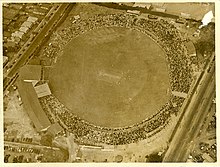
Greyhound racing meetings were held during 1928 at the ground.[11]
The Gabba shared first-class cricket matches with the Exhibition Ground until 1931. The first Sheffield Shield match at the Gabba was scheduled to be played between 31 January 1931 and 4 February 1931, but it was washed out without a ball being bowled. The first Test match at the Gabba was played between Australia and South Africa between 27 November and 3 December 1931.
In 1972, a greyhound track was installed at The Gabba with night meetings held weekly at the ground for 21 years.[12]

Expansion
From February 1993, work commenced on turning The Gabba into an all-seater stadium. The last greyhound meeting was held at The Gabba on 5 February 1993, with work commencing shortly after to remove the greyhound track around the ground to accommodate the relocation of the Brisbane Bears from Carrara (on the Gold Coast) to The Gabba, renovating the Sir Gordon Chalk Building to house the Bears Social Club and change rooms, refurbishing the Clem Jones stand (named for the long-standing Mayor of Brisbane, Clem Jones), the construction of a new Western grandstand, and extending the playing surface to cater for Australian rules football.The work was largely completed by 11 April when the Bears hosted their first AFL game at the renovated venue against Melbourne in front of 12,821 spectators.[13]
Subsequent further renovations at the ground commencing in 1995 saw the current two tier stands constructed in stages with the last stage completed in 2005 when the Brisbane Lions Social Club (formerly the Brisbane Bears Social Club) was demolished and replaced with a 24 bay grandstand spread over 3 levels of seating with the entire redevelopment costing $AU128 million.[14] Also as part of the redevelopment, five light towers were installed to allow for night football and cricket matches to take place, a light tower at the school end was removed in the late 90s to make way for the expanded grandstands. In mid-2020 the Gabba received a $35 million refurbishment of the stadium's media and corporate facilities, as well as entrances and spectator amenities.[15] The work was completed in October that year, shortly before the venue hosted the 2020 AFL Grand Final.[16]
2032 Summer Olympics
After Brisbane was awarded the rights to host the 2032 Summer Olympics by the International Olympic Committee, the Queensland Government announced the Gabba would be the central venue used for the Games. The government has proposed demolishing the stadium's foundations and rebuilding the Gabba with new grandstands in its place, which would seat approximately 50,000 spectators. The cost of the proposal was initially announced as $1 billion, but that figure was later revised to $2.7 billion. The venue is proposed to be used for Athletics along with the Opening and Closing ceremonies.[17]
The project was confirmed by the government in November 2023, who announced that demolition would commence in early 2026 and the new stadium to be open by late 2029.[18]
The Queensland Government has also announced that, as a result of the Gabba demolition and rebuild, the heritage listed East Brisbane State School will be closed. East Brisbane State School is one of Brisbane's oldest state primary schools, and pre-dates the Gabba having been established in 1899 on the eastern-most end of the block of land that now includes the Gabba.
On March 18, 2024, the plans for the rebuild were scrapped by the Queensland government.[19]
Sports played at the ground
Cricket



The Gabba is used from October to March for cricket and is home to the Queensland Cricket Association, the Queensland Cricketers Club, Brisbane Heat and the Queensland Bulls cricket teams. The venue usually hosts the first test match of the season each November, in addition to a number of international one-day matches usually held in January. The pitch is usually fast and bouncy.[citation needed]
The Gabba's amenities were greatly improved in the 1980s from a very basic standard, especially in comparison with other Australian cricket grounds. Test cricket was first played at the ground in November 1931, when the first test of the series between Australia and South Africa was held there. In December 1960, Cricket's first-ever tied test took place at the ground, when Richie Benaud's Australian team tied with Frank Worrell's West Indian side. Queensland clinched its first-ever Sheffield Shield title with victory over South Australia in the final at the ground in March 1995.[citation needed]
The Gabba was the first Australian venue to host an international Twenty20 cricket match.[20]
In November 1968 Colin Milburn scored 243, including 181 in the two-hour afternoon session, in a Sheffield Shield match for Western Australia vs. Queensland.[21][importance?]
As of June 2023, Australia's Michael Clarke holds the record for the highest number of runs scored in one test innings at the Gabba with 259 not out, breaking the previous record set by Alastair Cook.[22]
Australia has a formidable test match record at the ground. In the 55 matches played there, Australia has won 33, drawn 13, tied 1 and lost 9. The last loss came on 19 January 2021 against India in the 4th and final test of the 2020-21 Border-Gavaskar trophy.[23] India became the first Asian team to win a Test match at the Gabba.[24] This was Australia's first loss at the Gabba in 29 matches, and 32 years. England have a notoriously poor record at The Gabba, and have only won two test matches at the ground since the end of the Second World War. Many of their defeats have been heavy[25] and only seven England players have scored centuries at the ground.
On 15 December 2016, Australia hosted Pakistan for the first day-night Test at the Gabba,[26] and the first Australian day-night Test hosted outside the Adelaide Oval.
Australian rules football



Australian football has a long association with the ground. The Queensland Football League, a precursor to AFL Queensland played matches at the Gabba from 1905 to 1914, 1959 to 1971, and in the late 1970s and early 1980s. AFLQ matches resumed in 1993 as curtain-raiser events to AFL games, along with occasional AFLQ Grand Finals.[citation needed]
The first VFL/AFL game at The Gabba was held on June 28, 1981, with Hawthorn hosting Essendon in front of 20,351 spectators.[27] Six years later, the Brisbane Bears were admitted into the VFL but would initially play their home games at Carrara Stadium on the Gold Coast. The Brisbane Bears experimented with playing four matches at the Gabba in Brisbane in 1991, before moving all home matches to the venue ahead of the 1993 season. The Gabba was then the official home ground for the Brisbane Bears from 1993 to 1996 and since 1997 has been the home of the Brisbane Lions after the Bears merged with Fitzroy. The record crowd for an Australian rules football match is 37,473 between the Brisbane Lions and Richmond in the 2019 second qualifying final.[28]
Interstate games, including the 1961 national carnival have also been played there, as was a demonstration game during the 1982 Commonwealth Games. In 1991 the Gabba was host to Queensland's only victory over a Victorian side. In 1998 the Gabba hosted an AFL State of Origin match between the Allies and Victoria. [citation needed]
The Gold Coast Suns have hosted games at The Gabba in 2011 and in 2018 due to the unavailability of their home ground Carrara Stadium because of redevelopment and the 2018 Commonwealth Games respectively.[citation needed] In addition, Melbourne FC played an annual home game against Brisbane at The Gabba between 2001 and 2007.[29]
During the 2020 AFL season, the Gabba hosted a greater number of home and away matches than usual, due to the temporary relocation of Victorian and other clubs as a result of the COVID-19 pandemic. The venue was also selected to host the 2020 AFL Grand Final, with the Melbourne Cricket Ground not capable of hosting any spectators at the match. The Gabba thus became the first stadium outside the state of Victoria to host a VFL/AFL Grand Final, which Richmond won against Geelong by 12.9 (81) to 7.8 (50) in front of 29,707 people – just under the venue's temporary maximum capacity due to the pandemic.[30] Since the MCG began hosting VFL/AFL Grand Finals (VFL until 1989, AFL afterwards), only four other venues had done so: Princes Park (1942, 1943 and 1945), the St Kilda Cricket Ground (1944), Waverley Park (1991), and Optus Stadium (2021).[citation needed]
Soccer
In the early 1900s, the Gabba hosted numerous matches between Australia and various touring nations.[31] During the 1950s and 1960s the Gabba hosted soccer matches for English first division and Scottish clubs including Blackpool FC, Everton FC, Manchester United and Heart of Midlothian F.C.[32] The Chinese and South African national teams also played at the ground. During the 2000 Summer Olympics, the Gabba hosted association football group games.[33]
Rugby league
On 8 May 1909, the first match of rugby league was played in Brisbane at the Gabba. Norths played against Souths before a handful of spectators at the ground.[34] Brisbane Rugby League games continued to be played occasionally at The Gabba until 1957.[35]
The Gabba hosted its first rugby league Test match on 26 June 1909, when Australia defeated New Zealand Māori 16–13.[36]
The Queensland Rugby league team hosted a match of the 1953 American All Stars tour of Australia and New Zealand at the Brisbane Cricket Ground.[citation needed]
The Kangaroos continued to play Tests at this venue until 1956, and a ground record crowd of 47,800 people saw Australia play Great Britain in 1954. From 1932 to 1957 the Gabba was also used to host interstate matches and International Rugby League Finals from 1909 – 1956.[citation needed]
Rugby League did not return to The Gabba until July 1, 2023, when the Brisbane Broncos moved three of their matches to the ground while their regular home ground Suncorp Stadium was unavailable due to the 2023 FIFA Women's World Cup.[37] The first NRLW game at the ground was played on July 27, 2023, when the Brisbane Broncos took on the Gold Coast Titans as a curtain raiser to the Men's game between the Broncos vs the Sydney Roosters.[citation needed]
Rugby league test matches
The Gabba hosted 11 rugby league test matches between 1912 and 1956.[38]
| Date | Home team | Opponents | Result | Attendance | Part of |
|---|---|---|---|---|---|
| 14 August 1909 | 16–13 | 8,000 | 1909 Māori tour | ||
| 6 July 1912 | 13–10 | 8,000 | 1912 Trans-Tasman Test series | ||
| 18 June 1932 | 15–6 | 15,944 | 1932 Ashes series | ||
| 4 July 1936 | 7–12 | 29,486 | 1936 Ashes series | ||
| 12 June 1948 | 13–4 | 23,014 | 1948 Trans-Tasman Test series | ||
| 1 July 1950 | 15–3 | 35,000 | 1950 Ashes series | ||
| 30 June 1951 | 23–11 | 35,000 | 1951 French rugby league tour of Australia and New Zealand | ||
| 28 June 1952 | 29–45 | 29,243 | 1952 Trans-Tasman Test series | ||
| 9 July 1954 | 21–38 | 46,355 | 1954 Ashes series (All time Gabba attendance record) | ||
| 2 July 1955 | 28–29 | 45,745 | 1955 French rugby league tour of Australia and New Zealand[39] | ||
| 23 June 1956 | 8–2 | 28,361 | 1956 Trans-Tasman Test series |
Rugby union
The Gabba has hosted six rugby union Test matches.
| Year | Home team | Result | Opponents | Crowd |
|---|---|---|---|---|
| 1907 | 5-14 | not known | ||
| 1914 | 0-17 | not known | ||
| 1950 | 6-19 | not known | ||
| 1951 | 6-16 | not known | ||
| 2001 | 13-29 | 37,460 | ||
| 2002 | 38–27 | 37,258 |
2000 Olympic Games
The Gabba hosted seven games of the 2000 Olympic Games Men's Football tournament including a Quarter final match.
| Date | Time (AEST) | Team #1 | Result | Team #2 | Round | Attendance |
|---|---|---|---|---|---|---|
| 13 September 2000 | 19:00 | 3–2 | Group C | 26,730 | ||
| 14 September 2000 | 19:00 | 3–1 | Group D | 24,616 | ||
| 16 September 2000 | 19:00 | 2–3 | Group C | 22,182 | ||
| 17 September 2000 | 19:00 | 1–3 | Group D | 36,326 | ||
| 19 September 2000 | 19:00 | 1–1 | Group C | 23,442 | ||
| 20 September 2000 | 19:00 | 1–0 | Group D | 36,608 | ||
| 23 September 2000 | 19:00 | 1–2 (a.e.t.) | Quarter final 2 | 37,332 |
Greyhound racing
Greyhound racing was also conducted at the Gabba prior to the redevelopment.[12] Meetings were held during 1928 and again from 1972 until 1993.[11]
Awards
In 2009, as part of the Q150 celebrations, the Gabba was announced as one of the Q150 Icons of Queensland for its role as a "structure and engineering feat".[40]
Largest crowds at the Gabba
| Sport | Date | Crowd | Event |
|---|---|---|---|
| Concerts | 4-5 March 2017 | 60,000 | Adele Live 2017 |
| Rugby league | 9 July 1954 | 46,355 | Ashes Australia vs Great Britain |
| Concerts | 6 November 2018 | 43,907 | Taylor Swift's Reputation Stadium Tour |
| International cricket | 9 January 2006 | 38,894 | 2005-06 T20 International: Australia vs South Africa |
| Australian rules football | 7 September 2019 | 37,478 | 2019 AFL Qualifying Final: Brisbane Lions vs Richmond |
| Rugby union | 30 June 2001 | 37,460 | 2001 British & Irish Lions tour to Australia: British & Irish Lions vs Australia |
| Soccer | 23 September 2000 | 37,332 | 2000 Olympic Football (men's) Brazil vs Cameroon |
| Domestic cricket (Big Bash League) | 5 January 2018 | 35,564 | 2017–18 BBL Season: Brisbane Heat vs Perth Scorchers |
Test cricket records
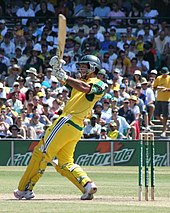
Batting
| Runs | Player | Period |
|---|---|---|
| 1,335 (26 innings) | 1996–2012 | |
| 1,030 (13 innings) | 2004–2013 | |
| 1,006 (11 innings) | 1974–1983 | |
| 963 (19 innings) | 2011–2022 | |
| 915 (26 innings) | 1986–2003 |
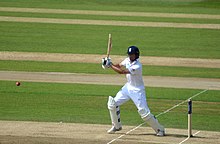


| Runs | Player | Period |
|---|---|---|
| 443 (8 innings) | 2006–2017 | |
| 314 (6 innings) | 1984–1992 | |
| 298 (8 innings) | 1978–1990 | |
| 278 (3 innings) | 1985–1987 | |
| 257 (4 innings) | 1933–1936 | |
| 257 (5 innings) | 1968–1984 |
| Runs | Player | Date |
|---|---|---|
| 259* v. South Africa | 9 Nov 2012 | |
| 235* v. Australia | 25 Nov 2010 | |
| 226 v. South Africa | 27 Nov 1931 | |
| 207 v. England | 27 Nov 1970 | |
| 201 v. Pakistan | 27 Nov 1981 |
| Centuries | Player | Period |
|---|---|---|
| 5 (11 innings) | 1974–1983 | |
| 5 (13 innings) | 2004–2013 | |
| 4 (15 innings) | 2000–2008 | |
| 4 (19 innings) | 2011–2022 | |
| 4 (26 innings) | 1996–2012 |
| Average | Player | Period |
|---|---|---|
| 111.77 (11 innings, 2 NO) | 1974–1983 | |
| 105.14 (7 innings, 0 NO) | 1931–1947 | |
| 103.00 (13 innings, 3 NO) | 2004–2013 | |
| 85.16 (8 innings, 2 NO) | 1965–1980 | |
| 84.37 (9 innings, 1 NO) | 1993–2000 |
Bowling
| Wickets | Player | Period |
|---|---|---|
| 68 (22 innings) | 1993–2006 | |
| 65 (26 innings) | 1993–2006 | |
| 46 (24 innings) | 2011–2022 | |
| 42 (20 innings) | 2011–2022 | |
| 40 (15 innings) | 1985–1995 |
| Wickets | Player | Period |
|---|---|---|
| 21 (6 innings) | 1980–1987 | |
| 19 (6 innings) | 1974–1982 | |
| 18 (9 innings) | 1984–2000 | |
| 15 (6 innings) | 1988–1996 | |
| 14 (5 innings) | 1993–2001 | |
| 14 (4 innings) | 1968–1975 |
| Figures | Player | Date |
|---|---|---|
| 9/52 v. Australia | 8 Nov 1985 | |
| 8/71 v. England | 25 Nov 1994 | |
| 7/23 v. Pakistan | 9 Nov 1995 | |
| 7/60 v. England | 29 Nov 1946 | |
| 6/17 v. West Indies | 23 Nov 2000 | |
| 6/23 v. Sri Lanka | 24 Jan 2019 | |
| 6/29 v. India | 28 Nov 1947 | |
| 6/41 v. Australia | 4 Dec 1936 | |
| 6/46 v. England | 29 Nov 1974 | |
| 6/47 v. England | 26 Nov 1982 |
Note: best innings figures limited to 10; there have actually been 27 six-wicket innings hauls at the Gabba.
| Figures | Player | Date |
|---|---|---|
| 15/123 v. Australia | 8 Nov 1985 | |
| 11/31 v. India | 28 Nov 1947 | |
| 11/77 v. Pakistan | 9 Nov 1995 | |
| 11/110 v. England | 25 Nov 1994 | |
| 11/134 v. England | 26 Nov 1982 | |
| 11/222 v. West Indies | 9 Dec 1960 |
| Strike rate | Player | Period |
|---|---|---|
| 22.7 (20 wickets) | 1946–1947 | |
| 32.4 (13 wickets) | 1933–1936 | |
| 34.5 (39 wickets) | 2017–2022 | |
| 37.9 (31 wickets) | 1974–1983 | |
| 38.2 (17 wickets) | 2006–2008 |
Team records
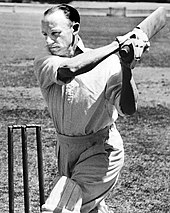
| Score | Team | Date |
|---|---|---|
| 645 | 29 Nov 1946 | |
| 6/607d | 3 Dec 1993 | |
| 9/602d | 23 Nov 2006 | |
| 8/601d | 26 Nov 1954 | |
| 585 | 18 Nov 2004 |
| Score | Team | Date |
|---|---|---|
| 58 | 4 Dec 1936 | |
| 58 | 28 Nov 1947 | |
| 76 | 18 Nov 2004 | |
| 79 | 7 Nov 2002 | |
| 82 | 23 Nov 2000 |
Partnership records
| Runs | Wicket | Players | Match | Date |
|---|---|---|---|---|
| 329* | 2nd | Alastair Cook (235*) & Jonathan Trott (135*) | 25 Nov 2010 | |
| 307 | 6th | Michael Hussey (195) & Brad Haddin (136) | 25 Nov 2010 | |
| 276 | 3rd | Don Bradman (187) & Lindsay Hassett (128) | 29 Nov 1946 | |
| 272 | 2nd | Matthew Hayden (197) & Ricky Ponting (123) | 7 Nov 2002 | |
| 269 | 1st | Michael Slater (169) & Greg Blewett (89) | 5 Nov 1999 |
| Runs | Wicket | Players | Match | Date |
|---|---|---|---|---|
| 269 | 1st | Michael Slater (169) & Greg Blewett (89) | 5 Nov 1999 | |
| 329* | 2nd | Alastair Cook (235*) & Jonathan Trott (135*) | 25 Nov 2010 | |
| 276 | 3rd | Don Bradman (187) & Lindsay Hassett (128) | 29 Nov 1946 | |
| 259 | 4th | Michael Clarke (259*) & Ed Cowan (136) | 9 Nov 2012 | |
| 228 | 5th | Michael Clarke (259*) & Michael Hussey (100) | 9 Nov 2012 | |
| 307 | 6th | Michael Hussey (195) & Brad Haddin (136) | 25 Nov 2010 | |
| 148 | 7th | Steve Smith (133) & Mitchell Johnson (88) | 17 Dec 2014 | |
| 135 | 8th | Adam Gilchrist (118) & Brett Lee (61) | 8 Nov 2001 | |
| 92 | 9th | Eddie Paynter (83) & Hedley Verity (23*) | 10 Feb 1933 | |
| 114 | 10th | Glenn McGrath (61) & Jason Gillespie (54*) | 18 Nov 2004 |
All records correct as of 23 December 2022.
VFL/AFL records
Player records
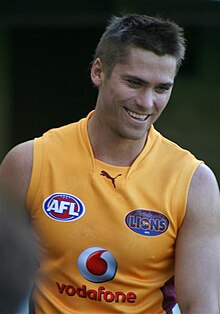
| Games | Player | Period |
|---|---|---|
| 170 | 1998–2013 | |
| 149 | 1998–2012 | |
| 147 | 1994–2008 | |
| 1992–2006 | ||
| 137 | 2009–2022 |

| Goals | Player | Period |
|---|---|---|
| 323 | 2000–2014 | |
| 295 | 1988–2004 | |
| 290 | 1996–2010 | |
| 184 | 1995–2010 | |
| 140 | 1992–2006 |
| Goals | Player | Match | Date |
|---|---|---|---|
| 11 | 14 Apr 1991 | ||
| 10 | 22 Jul 2007 | ||
| 29 Aug 1993 | |||
| 12 May 1991 | |||
| 9 | 2 Jul 2005 | ||
| 25 Jun 2000 |
| Disposals | Player | Match | Date |
|---|---|---|---|
| 47 | 26 Jul 2014 | ||
| 46 | 20 May 2018 | ||
| 45 | 4 Aug 2019 | ||
| 24 Aug 2014 | |||
| 26 Jul 2014 |
Team records
- Highest score: Brisbane Bears 33.21 (219) defeated Sydney 8.9 (57), 16 May 1993
- Lowest score: Sydney 3.8 (26) defeated by Richmond 4.10 (34), 12 July 2020
- Biggest margin: Brisbane Bears defeated Sydney, 162 points, 16 May 1993
Last updated: 1 October 2022.[56]
See also
- Lang Park
- List of Australian Football League grounds
- List of Big Bash League venues
- List of cricket grounds in Australia
- List of Oceanian stadiums by capacity
- List of sports venues in Australia
- List of Test cricket grounds
References
- ^ "Gabba". Austadiums. Archived from the original on 29 April 2021. Retrieved 14 August 2022.
- ^ a b "Lions eye first Gabba sellout since Fev's debut". AFL.com.au. 15 April 2019. Archived from the original on 7 November 2020. Retrieved 9 October 2020.
The capacity of the Gabba (as of April 2019) has been reduced to around 36,700 with the addition of a new scoreboard, extra space behind each team's bench and 'The Verandah' in recent years. Since then the largest AFL crowd was 37,478; in September 2019.
- ^ a b Gaskin, Lee (7 September 2019). "Tigers send finals warning by feasting on wayward Lions". AFL.com.au. Archived from the original on 26 July 2020. Retrieved 18 August 2020.
- ^ "Gabba (Brisbane Cricket Ground) – Austadiums". www.austadiums.com. Archived from the original on 17 June 2017. Retrieved 21 March 2018.
- ^ "Brisbane Cricket Ground – Australia – Cricket Grounds – ESPNcricinfo". Cricinfo. Archived from the original on 23 February 2018. Retrieved 21 March 2018.
- ^ "The main venues of the 2032 Olympic and Paralympic Games have changed. Here's the new plan". ABC News. 18 March 2024. Archived from the original on 18 March 2024. Retrieved 19 March 2024.
- ^ "About Us". The Gabba. Archived from the original on 25 April 2019. Retrieved 25 April 2019.
- ^ Meyn, Travis. "Ashes Extras: Brisbane Heat batsman Chris Lynn enjoys first Test from the Gabba pool deck". news.com.au. Archived from the original on 26 December 2017. Retrieved 26 December 2017.
- ^ "Pictorial Brisbane 1860 – 1875". Brisbanehistory.com. Archived from the original on 27 June 2012. Retrieved 19 July 2012.
- ^ "The Home of CricketArchive". cricketarchive.com. Archived from the original on 1 December 2017. Retrieved 21 March 2018.
- ^ a b "THE HISTORY OF THE GABBA GREYHOUND RACING CLUB". Brisbane Greyhound Racing Club. Archived from the original on 19 January 2021. Retrieved 4 March 2021.
- ^ a b "The history of the Gabba Greyhound Racing Club". Just Racing. Archived from the original (Web article) on 18 July 2008.
- ^ "From Carrara to the Gabba". lions.com.au. 29 December 2019. Archived from the original on 30 October 2020. Retrieved 27 October 2020.
- ^ "Gabba (Brisbane Cricket Ground) - Austadiums". www.austadiums.com. Archived from the original on 17 June 2017. Retrieved 16 June 2020.
- ^ "Work to upgrade the Gabba underway". Austadiums.com. 13 June 2020. Archived from the original on 18 September 2020. Retrieved 23 October 2020.
- ^ "Upgraded Gabba ready for Grand Final". Austadiums.com. 21 October 2020. Archived from the original on 1 November 2020. Retrieved 23 October 2020.
- ^ Cameron Voss (20 April 2021). "New-look Gabba central to 2032 Brisbane Olympics". Austadiums.com. Archived from the original on 27 April 2021. Retrieved 27 April 2021.
- ^ "Confirmed: Gabba to be demolished & rebuilt". Austadiums. 24 November 2023. Archived from the original on 25 November 2023. Retrieved 25 November 2023.
- ^ McKay, Jack; Riga, Rachel (21 March 2024). "Dumped Gabba rebuild proposal costs Queensland taxpayers $6.4 million". ABC News. Retrieved 23 March 2024.
- ^ Match Records Archived 30 September 2012 at the Wayback Machine Cricinfo
- ^ "Colin Milburn – An Indomitable Spirit | Cricket Features | Wisden Cricket Monthly". ESPN Cricinfo. Archived from the original on 11 November 2012. Retrieved 19 July 2012.
- ^ "Ashes: England break records in draw with Australia". BBC Sport. 29 November 2010. Archived from the original on 16 December 2010. Retrieved 29 November 2010.
- ^ "Indian summer! Gabba streak ends with classic Test win". cricket.com.au. Archived from the original on 19 January 2021. Retrieved 19 January 2021.
- ^ "India becomes first Asian side to win at the Gabba". Cricbuzz. 19 January 2021. Archived from the original on 26 January 2021. Retrieved 20 January 2021.
- ^ "Cricket Records | Records | / | Brisbane Cricket Ground, Woolloongabba, Brisbane - England | Test matches | Match results | ESPN Cricinfo". Cricinfo. Archived from the original on 1 December 2021. Retrieved 20 November 2017.
- ^ "Australia v Pakistan: Steve Smith century puts hosts in charge in day-night Test; Matt Renshaw, Peter Handscomb shine". Australian Broadcasting Corporation. Archived from the original on 15 December 2016. Retrieved 15 December 2016.
- ^ "AFL Tables - Hawthorn vs Essendon". afltables.com. Archived from the original on 19 October 2021. Retrieved 10 April 2022.
- ^ Gaskin, Lee (7 September 2019). "Tigers send finals warning by feasting on wayward Lions". AFL.com.au. Archived from the original on 9 September 2019. Retrieved 7 September 2019.
- ^ Bulcher, Peter (22 March 2023). "Demons Rivalry By The Numbers". lions.com.au. Archived from the original on 1 January 2024. Retrieved 1 January 2024.
- ^ "This is a win for Queensland: AFL reveals how QLD won race for historic Grand Final as key fixture details confirmed". Fox Sports. 2 September 2020. Archived from the original on 19 April 2021. Retrieved 2 September 2020.
- ^ Behrent, Sue (2011). History of the Socceroos. Camberwell, Vic.: Penguin Books. ISBN 9780670074266.
- ^ "1959051601 Hearts and Scottish Football Reports for Sat 16 May 1959 Page 01 of 01". Archived from the original on 23 May 2015. Retrieved 23 May 2015. Newspaper report
- ^ 2000 Summer Olympics official report. Archived 9 November 2000 at the Wayback Machine Volume 1. p. 392.
- ^ Pramberg, Bernie (2 May 2009). "Leo Donovan special guest at BRL celebrations". The Courier-Mail. Australia: Queensland Newspapers. Archived from the original on 6 February 2012. Retrieved 29 April 2010.
- ^ "BRL 1957 - RLP". www.rugbyleagueproject.org. Archived from the original on 1 August 2023. Retrieved 1 August 2023.
- ^ Ferguson, Shawn Dollin and Andrew. "Maori Tour 1909 Series - Game 7 - Rugby League Project". www.rugbyleagueproject.org. Archived from the original on 30 August 2017. Retrieved 21 March 2018.
- ^ "Broncos Secure Gabba For Three Games In 2023". Brisbane Broncos. 23 September 2022. Archived from the original on 23 September 2022. Retrieved 23 September 2022.
- ^ Ferguson, Shawn Dollin and Andrew. "Brisbane Cricket Ground - Results - Rugby League Project". www.rugbyleagueproject.org. Archived from the original on 21 March 2018. Retrieved 21 March 2018.
- ^ "Les Chanticleers Tour 1955 - Rugby League Project". www.rugbyleagueproject.org. Archived from the original on 7 July 2017. Retrieved 22 November 2019.
- ^ Bligh, Anna (10 June 2009). "PREMIER UNVEILS QUEENSLAND'S 150 ICONS". Queensland Government. Archived from the original on 24 May 2017. Retrieved 24 May 2017.
- ^ "Batting records | Test matches | Cricinfo Statsguru | ESPNcricinfo.com". Cricinfo. Archived from the original on 28 June 2021. Retrieved 28 June 2021.
- ^ "Batting records | Test matches | Cricinfo Statsguru | ESPNcricinfo.com". Cricinfo. Archived from the original on 28 June 2021. Retrieved 28 June 2021.
- ^ "Batting records | Test matches | Cricinfo Statsguru | ESPNcricinfo.com". Cricinfo. Archived from the original on 9 July 2021. Retrieved 30 June 2021.
- ^ "Batting records | Test matches | Cricinfo Statsguru | ESPNcricinfo.com". Cricinfo. Archived from the original on 9 July 2021. Retrieved 30 June 2021.
- ^ "Batting records | Test matches | Cricinfo Statsguru | ESPNcricinfo.com". Cricinfo. Archived from the original on 15 December 2021. Retrieved 15 December 2021.
- ^ "Bowling records | Test matches | Cricinfo Statsguru | ESPNcricinfo.com". Cricinfo. Archived from the original on 9 July 2021. Retrieved 1 July 2021.
- ^ "Bowling records | Test matches | Cricinfo Statsguru | ESPNcricinfo.com". Cricinfo. Archived from the original on 9 July 2021. Retrieved 1 July 2021.
- ^ "Bowling records | Test matches | Cricinfo Statsguru | ESPNcricinfo.com". Cricinfo. Archived from the original on 9 July 2021. Retrieved 1 July 2021.
- ^ "Bowling records | Test matches | Cricinfo Statsguru | ESPNcricinfo.com". Cricinfo. Archived from the original on 9 July 2021. Retrieved 1 July 2021.
- ^ "Bowling records | Test matches | Cricinfo Statsguru | ESPNcricinfo.com". Cricinfo. Archived from the original on 21 December 2021. Retrieved 21 December 2021.
- ^ "Team records | Test matches | Cricinfo Statsguru | ESPNcricinfo.com". Cricinfo. Archived from the original on 9 July 2021. Retrieved 1 July 2021.
- ^ "Brisbane Cricket Ground, Woolloongabba, Brisbane Cricket Team Records & Stats | ESPNcricinfo.com". Cricinfo. Archived from the original on 3 July 2022. Retrieved 29 December 2021.
- ^ "Partnership records | Test matches | Cricinfo Statsguru | ESPNcricinfo.com". Cricinfo. Archived from the original on 9 July 2021. Retrieved 1 July 2021.
- ^ "Brisbane Cricket Ground, Woolloongabba, Brisbane Cricket Team Records & Stats | ESPNcricinfo.com". Cricinfo. Archived from the original on 3 July 2022. Retrieved 28 December 2021.
- ^ a b c d "AFL Tables - Gabba". afltables.com. Archived from the original on 18 July 2014. Retrieved 21 March 2018.
- ^ "AFL Tables - Gabba". AFL Tables. Archived from the original on 1 October 2022. Retrieved 1 October 2022.
- History of the Gabba
- AFL Capacity
- Overview of Information about the Gabba Archived 21 July 2004 at the Wayback Machine
- Brisbane Lions information[permanent dead link]
External links
- Official website

- Brisbane Cricket Ground – Queensland Government Legislation Act, 1993 (.pdf file)
- Brisbane Cricket Ground – Statistical Overview (Test Cricket) – HowSTAT! Grounds Statistics
- "Brisbane Cricket Ground Redevelopment, Brisbane, QLD". Archived from the original on 20 September 2006.
- The Gabba at Austadiums
- "Woolloongabba Busway Station map – includes showing some of the surrounding area" (PDF). Archived from the original (PDF) on 21 September 2006.
- Woolloongabba Cultural Mapping Oral History. State Library of Queensland (includes Clem Jones recalling his involvement in cricket at the Gabba)
- Satellite photo of the Gabba
- Brisbane Lions
- World Stadiums Archived 21 August 2013 at the Wayback Machine
- Australian Football League grounds
- Brisbane Lions
- Sports venues in Brisbane
- Test cricket grounds in Australia
- Rugby League World Cup stadiums
- Venues of the 2000 Summer Olympics
- Venues of the 2032 Summer Olympics and Paralympics
- Olympic athletics venues
- Olympic football venues
- Olympic stadiums
- Defunct greyhound racing venues in Australia
- Culture of Brisbane
- History of Brisbane
- Rugby union stadiums in Australia
- Multi-purpose stadiums in Australia
- 1895 establishments in Australia
- Gold Coast Suns
- Woolloongabba
- Sports venues completed in 1895
- 2015 Cricket World Cup stadiums
- Women's Big Bash League
- North East Australian Football League grounds
- 1992 Cricket World Cup stadiums
- Q150 Icons
- Music venues in Australia
- Cricket grounds in Queensland



